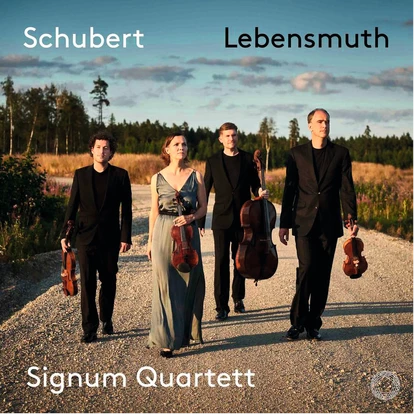Lebensmuth
Lebensmuth: Illuminating Schubert’s Legacy Through Strings and Song
June 2023
In their latest release, “Lebensmuth,” the Signum Quartett embarks on a musical expedition that delves into the profound world of Franz Schubert’s compositions. This ensemble demonstrates an unwavering commitment to precision and emotional resonance, leading to an intricate tapestry of musical expression.
The crowning jewel of the album is undeniably Schubert’s final string quartet, No. 15 in G major, D887. The Signum Quartett’s meticulous approach shines brilliantly in this work. The slow movement, in particular, stands out for its passionately rendered visionary middle section, enveloping the listener in a sonic reverie. The quartet’s deliberate tempo choice for the tarantella-like finale provides a unique perspective, enhancing the music’s emotional depth. It’s worth noting, however, that a ponderous ritardando during the final two chords slightly interrupts the overall fluidity of the performance.
Schubert’s inaugural string quartet, D18, serves as a poignant reminder of the composer’s formative years. Written when Schubert was a mere 13 years old, this quartet reflects an affinity for orchestral elements and a touch of rigidity inherent to youthful experimentation. While lacking the intricate sophistication of his later compositions, D18 offers a glimpse into Schubert’s burgeoning artistry.
The album also introduces song arrangements thoughtfully crafted by Xandi van Dijk, the quartet’s viola player. These adaptations breathe new life into Schubert’s Lieder, seamlessly transitioning them into the chamber music domain. Yet, some arrangements may leave listeners yearning for the grandeur and intricacy found in the original vocal renditions, as the nature of chamber instrumentation occasionally trims away layers of complexity.
“Lebensmuth” by Signum Quartett emerges as a profound exploration of Schubert’s legacy, aptly portraying the quartet’s meticulous craftsmanship and emotional depth. While the spotlight shines brightest on the interpretation of Schubert’s final quartet, the inclusion of his early work and the artful song arrangements enrich the musical mosaic. The Signum Quartett’s dedication to interpreting Schubert’s compositions with sensitivity and innovation solidifies this release as a significant addition to the classical music aficionado’s library.

